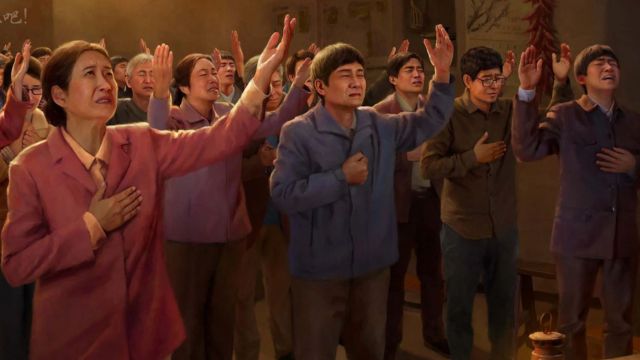The notion of COI is in itself ambiguous. However, the more recent COI dealing with The Church of Almighty God are often better and more reliable than the older ones.
by Massimo Introvigne, James T. Richardson, and Rosita Šorytė
Article 1 of 9.

As the persecution grows in China, as “Bitter Winter” has repeatedly documented, so grows the number of asylum applications of members of The Church of Almighty God (CAG), a heavily persecuted Christian new religious movement. Happily, a significant number of these asylum applications are granted. But others are rejected, for reasons that repeat themselves from one country to another. In 2021, we published a scholarly study of these reasons, answering them and trying to show they are ill-founded. We republish it here, with some variations and updates.
In general, the number of refugees fleeing China has greatly increased. Most of those who seek asylum are Uyghurs, or members of other Turkic minorities from Xinjiang, whose refugees have now exceeded the Tibetans. In these cases, however, asylum applications, while mentioning religion, are based on discrimination and persecution suffered because of a broader cultural identity. Islam and Buddhism are not forbidden in China, although Uyghurs or Tibetans may be prosecuted for alleged illegal or “extremist” religious practices. But the criminal statutes enforced against them refer, more commonly, to “separatism,” i.e., to advocating for independence of Tibet or East Turkestan (the Uyghur name for Xinjiang).
The situation is, however, different for Christians from the so-called “house churches,” Protestant communities that are not part of the government- controlled Three-Self Church, the only Protestant body authorized to operate legally in China. Circumstances also are different for members of the new religious movements banned there as “xie jiao,” an expression often translated as “evil cults” but in fact meaning, since the Middle Ages, “organizations spreading heterodox teachings.” While the situation of house church Christians became worse under President Xi Jinping, they have enjoyed for decades some limited tolerance, unless they crossed certain red lines and criticized the Chinese Communist Party (CCP). Their situation, while certainly not comfortable, was never as bad as the merciless persecution of the xie jiao. We are aware of several cases where house church Christians escaped China and sought asylum abroad, but they seem to be in the hundreds rather than in the thousands, although they too are increasing.
The two most persecuted movements among those labeled by the CCP as xie jiao are Falun Gong and The Church of Almighty God (CAG). We are not aware of any statistics about Falun Gong asylum seekers. However, based on interviews with UNHCR (Office of the United Nations High Commissioner for Refugees) officers and lawyers specialized in handling cases of Chinese refugees in several countries, we believe that Falun Gong cases may now be less than those involving CAG devotees.

Two of us are scholars of new religious movements (NRM), and one is a former diplomat and a human rights activist. We became interested in The Church of Almighty God in the mid-2010s, after the sensational (and false) accusations that it was responsible of serious crimes, including the brutal murder of a woman in a McDonald’s diner in Zhaoyuan, Shandong, in 2014, made it the target of anticult attacks relayed by media all around the world. In fact, Western scholars and even Chinese investigative journalists writing for CCP-owned media concluded that the murder had not been perpetrated by CAG members. The CCP, however, used the crime as a pretext for a massive crackdown on the CAG. One of the by-products of the incident was that the CAG caught the attention of NRM scholars, including the undersigned.
Introvigne and Richardson attended events on CAG in China organized by governmental institutions, and interviewed anti-cultists and police officers involved in the repression of the movement. Introvigne and Šorytė interviewed hundreds of CAG refugees, and their lawyers, in a good dozen of different countries. All three authors served as expert witnesses in CAG refugee cases, either orally or through affidavits. We also established a Google Group where lawyers representing CAG asylum seekers can exchange information and decisions. And we encouraged the CAG itself to collect asylum decisions throughout the world. This was easier in some countries, including Italy and France, and almost impossible in others, particularly in the United States, where most CAG refugees deal with their cases without seeking the cooperation of the church. At any rate, the asylum process is very slow in the U.S., and less CAG decisions have been rendered to date than in Europe.
Those rendered by Immigration Courts, of which we saw some examples, do not include a detailed examination. In some countries, administrative decisions were issued without grounds (in the simple form “asylum has been granted,” or denied). In Spain, where more than 500 asylum applications have been filed, only since 2020 did applications start being examined, due to the large backlog work of the Spanish authorities, who were confronted with a massive and unforeseen influx of refugees from Venezuela. Several applications were rejected for procedural rather than substantive reasons, claiming that the applicants missed some item on the application form or did not show up for the scheduled interviews, which in some cases happened because of the COVID-19 situation. Lawyers have appealed all these negative decisions, and suspect they were just a quick way of disposing of the backlog cases.
While in countries such as South Korea and Japan, which are well-known for granting asylum to an extremely limited number of refugees in general, the situation has remained negative (except for one favorable 2021 case in Seoul), in other countries the more recent cases have a higher percentage of success than the older ones, for reasons connected with an improvement in the COI (Country of Origin Information, i.e., documents about the human rights situation in a given country accepted as authoritative sources by authorities dealing with asylum applications). It is also the case that, despite hundreds of departure orders in various democratic countries, only a handful of refugees have actually been deported to China. Most countries are reluctant to enforce orders of deportation, particularly after a 2021 decision against Switzerland of the United Nations Committee Against Torture, stating that CAG members denied asylum and deported back to China are at risk of torture there.
It is not our purpose here to discuss the history and theology of the CAG, the largest Christian new religious movement in China. Chinese government’s sources claim it has four million members. Although some scholars think the number may be inflated, the situation in China makes collecting reliable statistics impossible. The CAG was established in China in 1991. Its main teaching is that Jesus Christ has returned and incarnated as a Chinese woman, whom followers worship as Almighty God. While Jesus brought salvation, Almighty God will eradicate the sinful nature of the purified believers, and usher in a millennial kingdom.
Before examining the different issues leading to positive or negative decisions, the question should be discussed of what sources the administrative authorities and the courts rely on for their decisions. Normally in refugee cases COI are mentioned but, as some of the decisions themselves astutely observed, the notion of COI is not unequivocal. COI should be sources of information on a certain country or issue regarded as reliable. But how is their reliability assessed? In some countries, the fact that they are included in the large online data base Refworld, maintained by the United Nations refugee agency UNHCR, is regarded as crucial. In Europe, there is also the data base of EASO, the European Asylum Support Office, a specialized agency of the European Union. Several governments publish their own COI in their national languages, and sometimes they translate them into English for international use. While COI published by governments and inter-governmental international organizations are normally considered more authoritative, in some decisions the word “COI” is sometimes used to designate also works by scholars, well-known NGOs, and sometimes media regarded as reliable, such as the BBC or “The New York Times.” Unfortunately, in the aftermath of the McDonald’s murder, some otherwise reliable media just republished Chinese propaganda, depicting the CAG as a sinister and violent “cult.”

This complicated situation sometimes generates paradoxical results. In Italy, for instant, students in a Rome university were asked, as part of a “legal clinic,” to prepare something they called COI, a compilation of materials that may assist immigration officers. The Court of Rome supported the legal clinic and stipulated an agreement of cooperation with the University. In 2019, these students compiled a report on the CAG, which unfortunately included serious mistakes and a general approach hostile to the Church. They were students from a law school rather than from a religious studies department, with a limited understanding of the intricacies of Chinese religions, yet their report, perhaps because it was easily available on the Web and was labeled “COI,” was quoted in some Italian negative decisions denying asylum to CAG refugees. This happened despite the fact that much better COI on the CAG had been produced by the Italian governmental agency supervising asylum cases, and uploaded on the European EASO data base.
The first decisions about CAG asylum seekers were mostly negative, and based on COI with incomplete and often erroneous information on the Church. There were two reasons for this. First, COI are based either on scholarly studies or on journalistic sources. The latter, even when published in the West, mostly reflected official Chinese publications that tried to justify the persecution of the CAG. For independent scholars, studying the CAG in China, where it is heavily persecuted, is virtually impossible. Serious academic studies on the CAG started appearing after the Church established communities in democratic countries, i.e., from 2015 on, and became significant after 2017, in turn influencing some quality media. Second, as we learned by interviewing lawyers involved in asylum proceedings in different countries, Chinese embassies and consulates continue to supply authorities in the countries where the refugees arrive and courts of law with hostile information about the CAG.
Even when produced by governmental agencies, most pre-2017 COI on the CAG were inadequate, and sometimes relied on Chinese propaganda only. Some earlier French decisions quoted 2016 COI on the CAG prepared by the French immigration authorities (DIDR), which were almost exclusively based on anti-cult literature, produced in a country where campaigns against “cults” have been notoriously more virulent than elsewhere. However, while this report was influential at the administrative stage, French courts of law often ignored or criticized it, and granted asylum to CAG refugees.
Starting in 2017, however, the situation changed. While scholars had criticized COI produced in 2013 and 2014 by the Immigration and Refugee Board of Canada, often quoted in European decisions, the Canadian Board released new and updated COI in 2019, after consulting with the leading Western scholars who had written about the CAG.
On April 25–26, 2019, in Geneva, the Intergovernmental Consultations on Migration, Asylum and Refugees (IGC) held a closed-door China workshop focusing on the COI about the CAG and the need to reform them. One of the authors (Introvigne) was invited to attend and present on the CAG. A similar IGC meeting, where Introvigne again presented on the CAG, was held in The Hague in 2024.
Also in 2019, the Italian Ministry of Internal Affairs published its COI (in Italian) on the CAG and its persecution in China. A parallel COI report by the same Ministry highlighted how CAG members abroad are kept under surveillance and identified through facial recognition, so that they can be arrested if they return to China. In 2020, the Ministry of Foreign Affairs of the Netherlands published new COI on China, with a substantial section on the CAG. From 2019 on, the Department of State of the United States also regularly examined the persecution of the CAG in its yearly reports on religious liberty.

Although a CAG believer may find occasional incorrect details when CAG theology is discussed, these more recent documents are based on a serious effort to engage with the scholarly literature on the Church that is now available. They greatly helped refugees in asylum cases. In contrast to this, old and outdated COI often led to negative decisions, although in some cases courts of law were able to criticize them based on more recent scholarly literature.
Unfortunately, however, we still see decisions where old COI are used, the new COI are ignored, and information exposed as false both in the more recent COI and in texts written by scholars is still mentioned to deny asylum to CAG devotees.

Massimo Introvigne (born June 14, 1955 in Rome) is an Italian sociologist of religions. He is the founder and managing director of the Center for Studies on New Religions (CESNUR), an international network of scholars who study new religious movements. Introvigne is the author of some 70 books and more than 100 articles in the field of sociology of religion. He was the main author of the Enciclopedia delle religioni in Italia (Encyclopedia of Religions in Italy). He is a member of the editorial board for the Interdisciplinary Journal of Research on Religion and of the executive board of University of California Press’ Nova Religio. From January 5 to December 31, 2011, he has served as the “Representative on combating racism, xenophobia and discrimination, with a special focus on discrimination against Christians and members of other religions” of the Organization for Security and Co-operation in Europe (OSCE). From 2012 to 2015 he served as chairperson of the Observatory of Religious Liberty, instituted by the Italian Ministry of Foreign Affairs in order to monitor problems of religious liberty on a worldwide scale.



